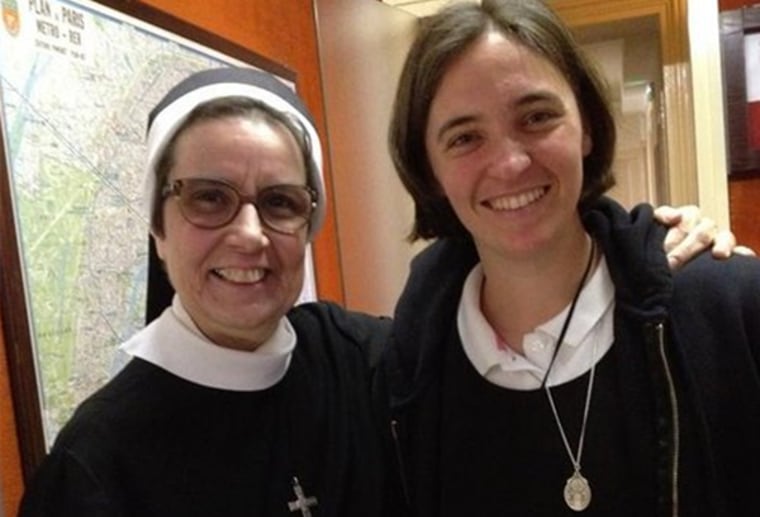Nicole Ferko’s $60,000 in student loans made her put off her dream of becoming a nun for a decade.
Ferko, who lives in Grand Prairie, Texas, graduated from a private Ohio Catholic university in 2002 and walked away with a huge loan burden.
“I knew I wanted to give my life to God, but I expected after college I’d go right in and work toward becoming a sister,” she said. But she discovered that individuals looking to become priests or nuns need to be debt free.
It took her until late last year to pay off her loans because she was unable to find many good-paying jobs and ended up racking up $20,000 in credit card debt. With the loans and credit cards paid off, Ferko, 32, is now on track to become a sister with The Sisters of the Holy Family of Nazareth, but she won’t reach her ultimate goal of donning a nun's habit until she’s 39 because the process takes that long.
“I thought I’d be a sister by almost 30 -- not almost 40,” she said. “If I had to do it all over again, I would have been smarter to have saved a lot more money.”
Hefty student loan debt is hampering the career dreams of many graduates whether they’re looking to enter religious vocations or work for corporate America. And with the rising cost of college tuition and increases in student loan default rates, the problem of graduates saddled with debt and unable to fulfill their work aspirations is expected to get worse.
Indeed, the average student-loan debt for graduates jumped 25 percent from 2000 to 2010 to nearly $17,000 in inflation-adjusted dollars, while average wages for workers 25 to 34 with bachelor's degrees dropped by 15 percent over the same time period, according to the Progressive Policy Institute.
Many students can’t afford to go into work that doesn’t pay well because sometimes they have hundreds, even thousands of dollars in monthly loan payments. Others who want jobs in offices or factories are being turned away because they have developed bad credit histories due to their student-loan debt, said Steven Rothberg, founder of CollegeRecruiter.com, which helps connect students and recent graduates with entry-level jobs.
In some cases where students have federally subsidized loans, Rothberg said, it’s better not to even take a low-paying job, because if you’re unemployed you don’t have to make loan payments.
A large number of corporations now do credit background checks on job candidates, and that spells trouble for graduates who have been late or have defaulted on their student loans.
According to a Department of Education report released late last year, student loan defaults are on the rise, increasing to 8.8 percent in fiscal year 2009, up from 7 percent the previous year. And 27 percent of student-loan borrowers are more than 30 days past due on payment, according to a recent report by the Federal Reserve Bank of New York.
And with more employers relying on credit checks, that's bad news for grads looking for work.
“An employer may not appreciate that a student loan was the cause of that, and even if they do they still may be very concerned about hiring somebody who is messed up financially,” said Rothberg.
Credit background checks -- now used by 13 percent of employers for all job candidates and 47 percent of the time for certain jobs, such as in financial services, according to the Society of Human Resource Management -- have come under fire in recent years because they may run afoul of the nation’s labor laws by impacting minority candidates disproportionately. Some states have moved to ban credit reviews for job candidates, but for now it’s an issue job seekers with credit problems must deal with.
When it comes to vocations within certain Christian orders, the issue of student loan debt, or any debt, won’t be going anywhere because it’s part of religious law, said Brother Paul Bednarczyk, executive director of the Chicago-based National Religious Vocation Conference, which commissioned a study that looked at the issue of debt-laden students looking to go into religious life.
The study by the Center for Applied Research in the Apostolate at Georgetown University, released this year, found 69 percent of religious orders “turned away at least one person because of student loans. In addition, many religious communities ask young people to delay their applications to enter because of educational debt.”
With tuition rising at a rate of 5 percent annually, Bednarczyk said, “the problem will only get worse in the future.”
As a result of the report, he said, his group is putting together guidelines to deal with candidates with debt. In some cases, religious orders have paid off applicant student debt but it’s becoming more financially stressful for these communities to pick up the tab, he explained.
“Since 1978, college tuition has increased by 900 percent,” he noted. “The president is trying to pass legislation to assist with that but that applies to people in college today -- not graduates.”
He referred to legislation that would keep interest rates from doubling to 6.8 percent on certain subsidized student loans.
At a time when the nation needs more individuals entering religious vocations, Bednarczyk said: “We have to turn people away because they’re too poor to take the vow of poverty.”
